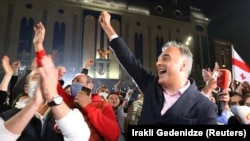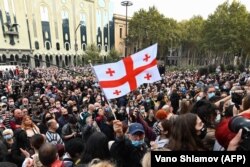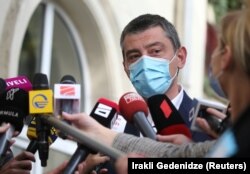At first glance, Georgia’s October 31 parliamentary vote might appear a major win for the country’s ruling Georgian Dream party. But Georgian election observers and opposition parties report violations of election law that, they imply, make the vote a loss for democracy.
Based on preliminary results, the Georgian Dream received 48.17 percent of the vote for Georgia’s 150-seat parliament – the first time the party has received less than half of the vote since coming to power in 2012.
Finishing a distant second, with 27.13 percent of the vote, was a partnership between ex-President Mikheil Saakashvili’s United National Movement (UNM), the country’s main opposition force, and the Strength in Unity opposition coalition.
Altogether, the eight opposition parties that crossed the one-percent vote threshold to enter parliament attracted nearly as many votes as the Georgian Dream – 45.62 percent. But all of these opposition parties, including the UNM bloc, have stated they will boycott parliament. None of them recognizes the preliminary results as legitimate.
Some politicians have also announced their intention to boycott runoffs that will be held on November 21 in 16 of the 30 first-past-the-post races where no candidate received a majority. But even if opposition parties boycott the vote, their candidates’ names cannot be withdrawn, noted the government news site Agenda.ge.
The Georgian Dream has dismissed their complaints, with the party's executive secretary, Irakli Kobakhidze, asserting on November 2 that they were "misled by their own reality."
"Truth is on the side of the Georgian Dream," Kobakhidze said, the Georgian news service Interpressnews reported.
Ex-Defense Minister Tina Khidasheli, a former member of the Georgian Dream government, argues that boycotting parliament would be a mistake. Given the opposition’s seats, “the Georgian Dream is in constant danger of losing its majority and will definitely lose that majority if the opposition enters parliament,” Khidasheli commented to the news service Interpressnews.
If it does, it will be able to “mechanically paralyze” the Georgian Dream majority, noted political strategist Gia Khukhashvili, who formerly advised a Georgian Dream coalition. Given the country’s pandemic and economic troubles, “the parliament will be unstable,” and early elections will have to be held “in at least a year,” Khukhashvili predicted to the daily Rezonansi.
Nothing suggests that the largest opposition parties are considering this option, however.
It was a disputed parliamentary vote in November 2003 that eventually brought Saakashvili’s UNM to power, and the veteran politician has long experience with Georgia's raucous political fights.
In an English-language video posted on Facebook, Saakashvili accused the Central Election Commission (CEC) of having changed the vote protocols. He included videos of apparent ballot-box stuffing and discussions of the protocols among election commission members to support his point.
Anti-corruption watchdog Transparency International Georgia, which deployed 600 observers, filed 46 complaints with the CEC about suspected violations of election law. Among the 170 problems it detected, physical violence, interference with observers and journalists, alleged voter bribery, and alleged vote falsification featured prominently.
Reviewing these incidents “makes it clear that the October 31 elections were a step back compared with the 2016 parliamentary elections,” the watchdog wrote.
The fact that the CEC took seven and a half hours to announce the preliminary results further encouraged distrust of the process, it noted. To boost voter trust, the non-profit has called on election officials to recount ballots in precincts with disputed results.
The Georgian Young Lawyers’ Association went a step further and denounced the vote as the worst organized since the Georgian Dream came to power in 2012. It detected “significant violations” throughout election day; primarily, violence, pressure on voters, and disorganized election commissions. Like Transparency International, it also took issue with the length of the CEC’s vote count, agreeing that it led to a “feeling of manipulation among citizens.”
Another watchdog, the International Society for Fair Elections and Democracy, calculated that eight percent of the final protocols submitted to the CEC showed a greater number of ballots cast than voter signatures. Transparency International detected this problem in seven percent of the summary protocols.
To boost voter trust, the latter NGO has called on election officials to recount ballots in precincts with disputed results.
Responding to the criticism, the CEC termed these statements “incorrect information” that is distributed “to create distrust in the electoral process and the election results.”
The discrepancy could be caused by a voter coming to vote in a first-past-the-post race for a precinct where he or she was not registered, the Committee claimed.
Saakashvili, among others, has capitalized on those discrepancies, posting a few such protocols on his Facebook page.
Yet on November 1, Prime Minister Giorgi Gakharia, now in self-isolation after testing positive for the coronavirus, praised the elections as “free, open and competitive.” He conceded, however, that there had been “some shortcomings” that “we need to work on …”
“It is this aspiration that brings us closer to building a European state,” Gakharia wrote on Facebook.
The international community appears inclined to hope so, too.
The Organization for Security and Cooperation in Europe, which deployed 377 observers for the elections, found that the vote was “competitive” and that “fundamental freedoms were respected,” but flagged a “blurring of the line” between the government and ruling party. The fact that election commissions were dominated by the Georgian Dream did not encourage the public to believe the vote was fair, the observers wrote in their preliminary assessment of the election.
The European Union repeated these remarks, noting the need to adhere to “democratic principles and standards and respect for human rights” as well as for “a free and pluralistic media environment.”
In a November 1 statement, the U.S. embassy called on the CEC to prevent instances of “voter intimidation, vote buying, interfering with ballot secrecy,” use of administrative resources and violence against election observers and journalists in future.
These problems, “while not sufficient to invalidate the results, continue to mar Georgia’s electoral process and are unacceptable,” the embassy wrote.
Abuse of administrative resources by Georgia’s ruling parties, voter intimidation, and the lack of objective news reporting have been long-standing complaints about the country’s national votes.
Nonetheless, the Georgian Dream emphasized closer ties with the West as one of the successes of its eight years in power. It intends to file an application for EU membership by 2024. That will give the country time to meet all the obligations it took on under its 2012 Association Agreement with the trade bloc, predicted Nikoloz Samkharadze, chief of staff for incumbent Parliamentary Speaker Archil Talakvadze.
It has made less progress with other promises, some complain.
Ivanishvili initially promised voters a sharp increase in salaries and pensions, interest-free loans, lower taxes and utility payments, and 100 new companies to reduce unemployment. None of these promises were met.
On the contrary, prices for utilities, food, and fuel increased. As of this spring-summer, the average monthly salary was just 1,150 laris or around $360, according to government statistics. Unemployment stood at 12.3 percent.
Against this backdrop, political analyst Gela Vasadze attributes the Georgian Dream staying in power to the lack of an “adequate opposition.”
The party tried for eight years “not to annoy the people” by not making huge reforms, but also claiming it had not ruined anything, Vasadze said to Current Time. “For that reason, people easily forgave these promises that they made and didn’t keep.”
As yet, whether or not most voters also see the promise of a free and fair election as broken is unclear.







